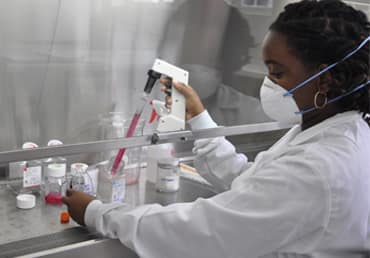
CARPHA Medical Microbiology Laboratory (CMML), as the regional reference laboratory, currently conducts tests for suspected COVID-19 cases for Member States using the World Health Organization (WHO) recommended testing protocol.
At present, samples can only be sent to CARPHA from the designated national public health laboratory in a country.
In Trinidad and Tobago, where CARPHA is headquartered, all samples from that country must be sent to the Trinidad PublicHealth Laboratory (TPHL), which is Trinidad and Tobago’s national reference laboratory. Once a sample is received, CARPHA will issue the result within 24-48 hours. COVID-19 results are sent to the Chief Medical Officers at the Ministries of Health, who are responsible for the dissemination of these results.
The CMML currently tests all suspected cases of COVID-19, asrecommended by the WHO case definition, provided by the WHO Global surveillance for COVID-19 caused by human infection with COVID-19 virus.
The CMML uses the Polymerase Chain Reaction (PCR) method, which is recommended by the WHO. This method remains the gold standard for COVID-19 laboratory diagnosis because the sensitivity and specificity of the test are nearly 100%. The CMML ensures appropriate quality control measures are followed to ensure the accuracy of all results.
The Caribbean Public Health Agency cannot and will not disseminate any country’s results directly to patients or individuals. It is an ethical breach and constitutes a violation of the Agency’s ethical standards to share confidential patient information with unauthorized persons.
Advertise with the mоѕt vіѕіtеd nеwѕ ѕіtе іn Antigua!
We offer fully customizable and flexible digital marketing packages.
Contact us at [email protected]
















I can only imagine the pressure that CARPHA Medical Microbiology Laboratory (CMML) is under. The pressure of trying to balance the need for more testing while having a prerogative to ensure tests are accurate.
Although, “polymerase chain reaction, typically detects over 90% of positive cases accurately” – all lab tests have some margin of error, measured in terms of sensitivity— the percent of positive cases a test accurately detects—and specificity, the percent of negative cases it accurately detects.
I guess all we can do is just hope and constantly inquire and demand that they are indeed ensuring appropriate quality control measures are followed to ensure the accuracy of all results.
Bearing in mind that incorrect results could be caused by differences in how samples or specimens are collected and transported, as well as underlying problems with testing platforms, and how long an individual has been infected before testing
Nevertheless, our priority should be getting more tests into the field because the more testing a country carries out, the more it will find people who have coronavirus with only mild symptoms, or perhaps no symptoms at all.
It is also worth remembering that the vast majority of people who get infected with coronavirus will recover.
Comments are closed.